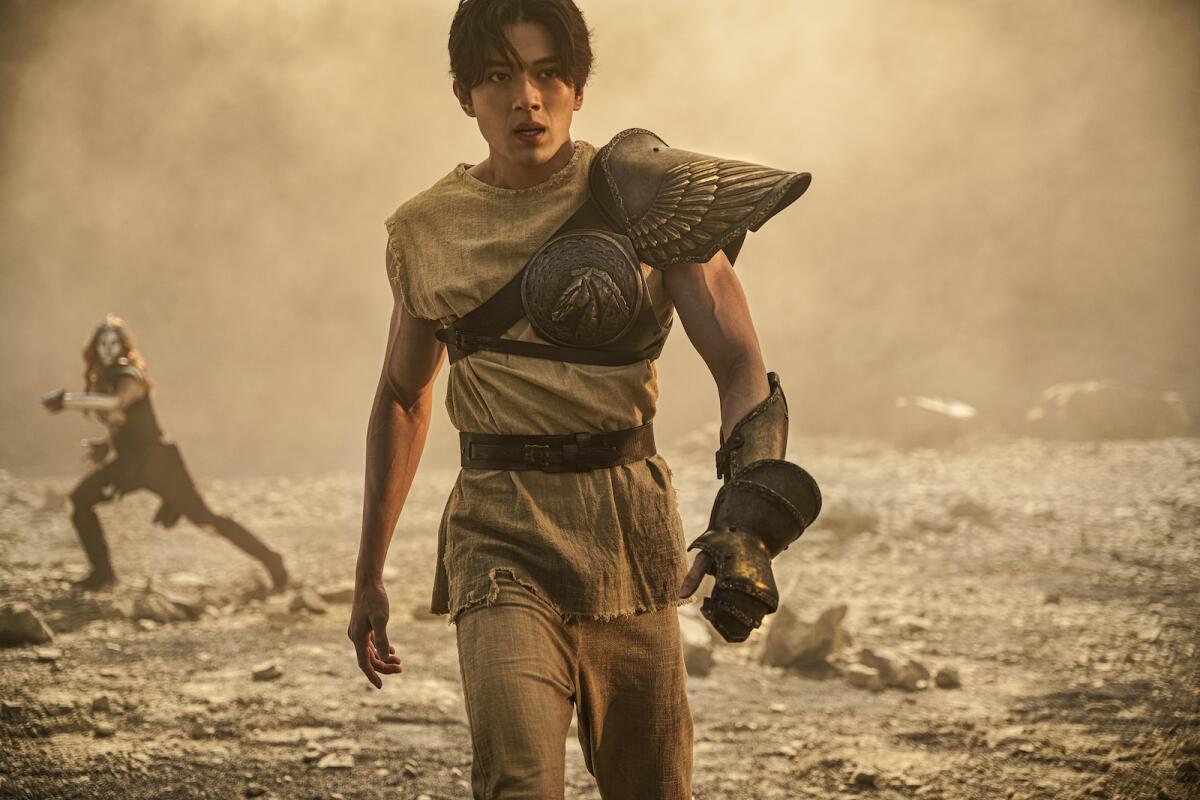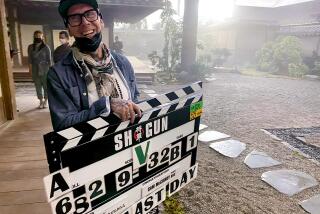Review: ‘Knights of the Zodiac’ is a bad sign for adaptations of beloved animation

- Share via
“Knights of the Zodiac,” a 2023 live-action reimagining of Masami Kurumada’s revered manga “Saint Seiya” and an anime series, procures plenty of recognizable elements from the original iterations. But based on a screenplay by a trio of Western writers and directed by Polish filmmaker Tomasz Bagiński, it quickly stumbles into narrative contrivances as it incessantly overworks certain emotional beats.
Seemingly cursed from conception, live-action adaptations of stories popularized in animated form, be it a Disney classic or a beloved anime, have almost universally failed to replicate the strengths of their source material with their photorealistic CGI visuals, star-studded casts and often unnecessarily expanded dramatic arcs. In their unmeasured hunger to capitalize on nostalgia and the promise of a built-in audience, studios time and again have refused to consider that what succeeded in one medium doesn’t inherently translate benignly into another.
“Saint Seiya” is merely the latest, though far from the last, victim of these ambitions. First published in Japan between 1986 and 1990, the mythology-laden saga tells of the adolescent heroes, each donned with a mystical armor representing a constellation, chosen to protect the reincarnation of the Greek goddess Athena and humanity from other deities.
An animated series produced almost concurrently with the release of the manga, and known internationally as “Knights of the Zodiac,” earned Kurumada’s epic narrative scores of fans beyond his homeland, namely in parts of Europe and across Latin America in the late ’80s and early ’90s. A heavily edited version of the admittedly violent anime was in the U.S. on cable in the early 2000s, but never caught on.
The new movie’s opening sequence, perhaps its most accomplished, sees a knight clad in gold armor entrusting the life of a baby, said to become Athena, to businessman Alman Kido (Sean Bean), while voice-over summarizes the story’s mythical essence. Some of the choices to expedite explaining the intricacies of the lore, such as the concept of the cosmos or the inner force knights channel during battle, might be off-putting to those zealously familiar with it.
Still, as Seiya, a young man destined to become the brave Pegasus Knight and the protagonist of this entire legend, Japanese American actor Mackenyu occasionally does capture the cheekily presumptuous personality of the character and later his unwavering allegiance to Sienna (Madison Iseman), the flesh-and-blood goddess of wisdom and war. Meanwhile, Seiya’s search for his long-lost sister, expressed in rather underwhelming flashbacks and visions, remains the main pathos in his odyssey here, as it was in the manga and anime.
But despite the inclusion of several touchstones and rousing musical cues (such as the classic theme track “Pegasus Fantasy”) as part of Yoshihiro Ike’s score, Bagiński fails to convey the muscular lyricism that characterized the anime, where every confrontation brimmed with devastating gravitas and high stakes that not only engrossed but moved the viewer. The brotherhood among Athena’s knights was also left on the drawing board, presumably in expectation of being able to tackle it in a sequel that likely won’t happen.
Instead, the filmmakers behind this subpar reinterpretation take major creative liberties to ground their plot in “logical” reality via the plan that Kido’s ex-wife, Guraad (Famke Janssen), executes to capture Sienna and prevent her from fully transitioning into her godly form. Guraad has Nero (a villainous Diego Tinoco), the Phoenix Knight, and street fighter Cassios (Nick Stahl) on her side to defeat Seiya. Sienna’s fear of not being able to control her own power, manifested in dodgy CGI-heavy nightmares, adds to the trouble.
Adaptations of this kind often struggle to effectively transmute the emblematic imagery or character traits of the animation to their hybrid live-action/CGI realm. Sienna’s purple hair is the most glaring culprit in this case. Bagiński’s approach, an uneven mix of faithfulness and reinvention — particularly in the look of the knights’ armors and how they are deployed — relies on colorful visual effects, which, while mostly unimpressive, somewhat evoke the bright and disembodied auras that Kurumada envisioned for these warriors. Marin (Caitlin Hutson), Seiya’s masked mentor and a female knight, stands as the most loyal and unforced transfer between mediums, both aesthetically and in demeanor.
From the overall production value, one can easily infer that the lack of popularity for the property in English-speaking territories prevented it from becoming a priority for the studio. The visibly insufficient budget, considering the scale of the action, results in a below-average action fantasy that sits just a couple steps above the quality seen in the sitcom-like “Power Rangers” universe — and I mean this not in a flattering manner.
That Bagiński’s “Knights of the Zodiac” amounts to a well-intended disappointment doesn’t mean it has zero merit as a work of entertainment, but it will neither satisfy the fandom’s demands for a true-to-the-bone homage to their childhood favorite, nor will it transmit to outsiders why this tale of blind courage in the face of insurmountable odds has inspired such decades-long devotion.
‘Knights of the Zodiac’
Rated: PG-13, for action/violence
Running time: 1 hour, 52 minutes
Playing: Starts May 12 in general release
More to Read
Only good movies
Get the Indie Focus newsletter, Mark Olsen's weekly guide to the world of cinema.
You may occasionally receive promotional content from the Los Angeles Times.










